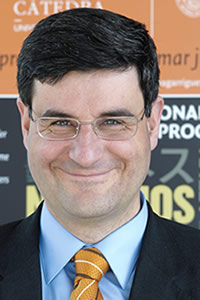http://en.wikipedia.org/wiki/Rafael_Domingo_Osle
Rafael Domingo Oslé, born in 1963 in Logroño,
La Rioja (Spain), is a Spanish jurist, legal academic and professor of law who specializes in ancient
Roman law,
Comparative law and Global law. Domingo is his first last name (in the Spanish system, people have two last names).

Rafael Domingo Oslé
[edit]Education
[edit]Academic and professional activities
After serving terms as associate professor of Roman law (1989) and tenured professor of Roman law (1993) at the University of Cantabria on Spain’s northern coast, in 1995 he was named the successor to his former teacher and mentor, the
Roman law scholar Álvaro d'Ors, at the
University of Navarra School of Law, where he served as Dean (1996-1999) and founding Director of the
Garrigues Chair in Global Law (2003-2009). Rafael Domingo is also founding Director of The Global Law Collection by
Thomson Reuters Aranzadi (2005) and founder and president of the Maiestas Foundation (2007). Domingo is Member of the Spanish Academy of Legal Science and Legislation, the Spanish Academy of Moral Sciences and Politics, the
Austrian Academy of Sciences, and the Academy of Social Sciences in Cordoba (Argentina). Domingo has been awarded the Medal of Honor, Toribio Rodriguez de Mendoza, by the Peruvian Constitutional Court (2006); the Rafael Martinez Emperador Prize by the Spanish Council of the Judiciary (2007; and the Medal of Honor by the Paraguayan Academy of Law (2009).
[edit]Global law
Domingo believes that the existence of a global law, which conceptually goes beyond and takes the place of contemporary notions of traditional international law, is a requirement of our time, as was the concept of the law of nations (jus gentium) in antiquity, or that of international law in the development of the modern world
[1].
According to Domingo
[2], the main difference existing between traditional international law and global law is that the former is based on the concept of state sovereignty, while global law must by necessity be based upon the inherent dignity of the human person. For Domingo, the law is in fact born of the person (
ex- persona oritur jus[3]), not of the State. Globalization, among its other consequences, has led to humanity as a whole acquiring legal relevance. In order to avoid domination by economic “cryptocracies”, imperialistic governments or transnational plutocracies, humanity as a collectivity must be legally and politically organized. However, the organization of humanity must not be like that of a global super-state or a sort of world-dominating empire, but rather it must be set up as an
Anthroparchy[4]. This is the name that Domingo proposes for humanity’s form of government under global law. Anthroparchy would be governed by a chief institution known as
United Humanity[5], the heir and successor to the UN (which would ultimately be disbanded), upon which the remaining global institutions would depend. Global law must become a true legal system, with its own rules of recognition, if one wishes to employ the terminology of
H. L. A. Hart[6].
For Domingo, the recognition rule adheres to the well-known legal maxim, the inspirational rule of democratic legal systems:
quod omnes tangit ab omnibus approbetur (
that which affects all people must be approved by all people)
[7]. The heart of the institution of United Humanity would be its Global Parliament. The unique jurisdiction and responsibility of this global legislative body would be to determine which matters are subject to that which Domingo refers to as the
global legal domain[8], that is, questions which must be by their very nature regulated by global law, as well as to what extent. Global law itself would actually constitute a very small part of existing law in the world, but would be a necessary addition to the entire global framework. Acting as communicating vessels do (as in the well-known science experiment, where a number of vertical tubes of different shapes communicate at the bottom and in which, due to a law of nature, water rises to the same level in all tubes), global law would allow the balancing and harmonizing of legal systems without forcibly imposing uniformity on them. Global law’s informing principles of horizontality and subsidiarity would prevent it from overreaching its jurisdictional limits of authority, which are subject-matter based, and not territorial, in nature.
[edit]Roman law and comparative law
In the field of Roman law, Domingo has carried out critical studies of Otto Lenel’s proposed reconstruction of the
Edictum Perpetuum[9], offering new considerations regarding (as well as a reconstruction of) the first edictal title on the jurisdiction of the praetor (
De iurisdictione). He also has analyzed the nature of the relationship between
auctoritas (authority) and
potestas (power), two genuinely Roman legal concepts central to the philosophy of Alvaro d'Ors, which Domingo covers in his book entitled,
Auctoritas (1999). This work provides a complete vision of Orsian thought. In the area of comparative law, Domingo has generally focused on medieval legal rules and aphorisms which are present in numerous (and differing) contemporary legal systems, in addition to the formation of modern Japanese law and, in particular, the Japanese Civil Code.
[edit]Major publications
- Estudios sobre el primer título del Edicto del Pretor [Studies on the First Part of the Praetor’s Edict] (Universidad de Santiago de Compostela, 1992, 1993, 1995)
- Auctoritas [On Authority] (Ariel, 1999)
- Código civil japonés. Estudio preliminar, traducción y notas [The Japanese Civil Code. Preliminary Study, Translation and Notes] (Marcial Pons 2000), con la colaboración de Nobuo Hayashi.
- Juristas universales [Universal Jurists] (editor and coordinator), 4 vols. (Marcial Pons, 2004)
- Ex Roma ius [From Rome, Law] (Thomson Aranzadi, 2005)
- Álvaro d’Ors, una introducción a su obra [Alvaro d’Ors, an Introduction to his Works] (Thosmon Aranzadi, 2005)
- Principios de Derecho Global. 1000 reglas jurídicas y aforismos comentados [Principles of Global Law. 1000 Legal Rules and Commented Aphorisms] (editor and coordinator) (Thomson Aranzadi, 2006)
- ¿Qué es el Derecho Global? [What is Global Law?] (Thomson Reuters Aranzadi, 2008)
- The New Global Law (Cambridge University Press, 2010)

No comments:
Post a Comment